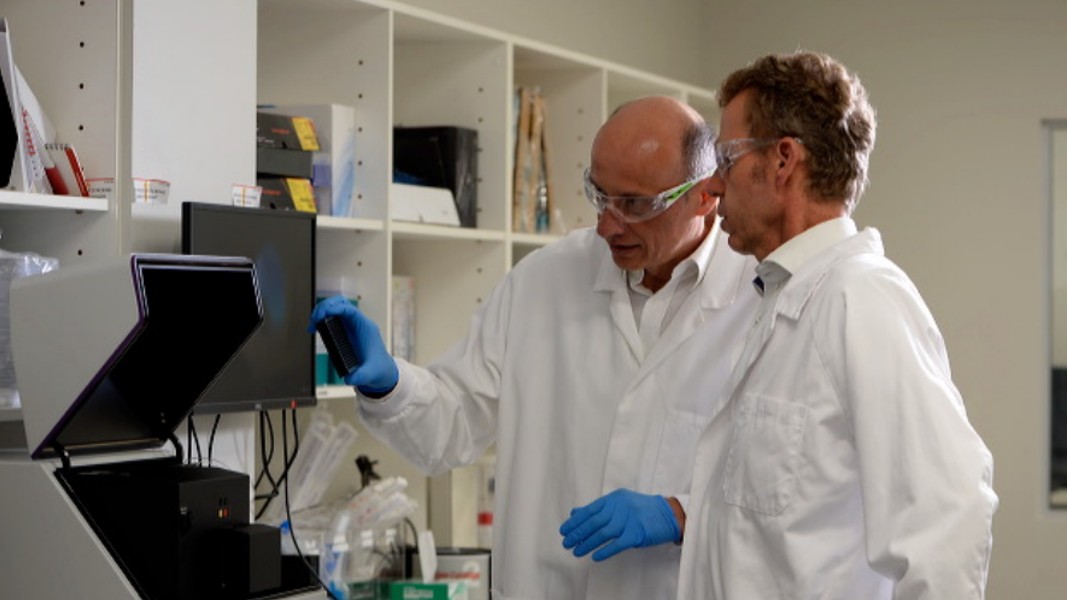Just days after closing their oversubscribed $9.8 million capital raise, drug developer Pharmaxis (ASX: PXS) has seen further funding devoted to its projects, this time from the Government to apply work towards skin diseases and pancreatic cancer.
The NMHRC Drug Development Grant scheme is an Australian government initiative set up to provide financial aid to fund research teams looking into drugs and treatments at the proof-of-concept stage. This financial support helps fast track drugs to trials and subsequent commercialisation.
If you’ve been following the Pharmaxis story you’ll be aware of their work in the fields of myelofibrosis, liver cancer and skin scarring; however, these latest grants are being put to use for other indications with Pharmaxis drug discoveries.
Associate Professor Thomas Cox from the Garvan Institute of Medical Research is leading a research team to explore Pharmaxis’ proprietary drug PXS-5505 as a treatment for pancreatic cancer.
Pancreatic cancer is an infamously aggressive cancer, affording sufferers a five year survival rate of less than 10%. Pancreatic cancer is also commonly resistant to chemotherapy.
The drug has already passed Phase 1 safety trials for myelofibrosis, is in a Phase 2 trials for myelofibrosis and is scheduled to commence a phase 1a/2c trial liver cancer later this year.
The new NHMRC Development Grant of $827,500 will support Professor Cox’s preclinical work of the experimental treatment in combination with chemotherapy.
Professor Cox gave us a mini science lesson, saying: “Treatment resistance in pancreatic cancer is partially driven by fibrosis- a process by which scar tissue builds up throughout and around the tumour tissue. This scar tissue can prevent treatments from reaching their tumour target and also stimulate cancer growth and spread. Tumours need specific enzymes called lysl oxidases to build the main constituent of this damaging scar tissue. Our preclinical studies in experimental models have revealed that targeting lysyl oxidases can reduce fibrosis and improve the efficiency of chemotherapy. Further, they have pointed us to an experimental therapy that we will now help progress to clinical trials.”
But that’s not all…. No, the folks over at PXS have a knack for attracting world class researchers to collaborate with. Renowned burns surgeon and researcher, Professor Fiona Wood has already been working with Pharmaxis leading clinical trials in their anti-skin scarring drug PXS-6302.
Professor Wood and colleagues Associate Professor Mark Fear of the University of Western Australia’s Burn Injury Research Unit, and Dr Mehra Haghi of the University of Technology Sydney have been quietly looking into another Pharmaxis discovery.
Plucked from their preclinical pipeline, the new drug is set to be investigated as a potential new treatment for tissue repair and inflammatory skin disease. This drug works outside of Pharmaxis’ proprietary amine oxidase platform that flagship drugs PXS-5505 and PXS-6302 are built on, proving, once again, the Company’s impressive ability to diversify its pipeline.
The government has awarded a grant to the UWA researchers to the tune of $590,200 to support preclinical work around the drug.
Associate Professor Mark Fear is keen to be working with another Pharmaxis drug, saying: “It is great to be working with Pharmaxis on a new compound and drug target to modify tissue repair and inflammatory skin disease. As our previous collaboration with the anti-fibrotic drug PXS-6302 now moves into clinical trials, this new grant gives us an opportunity to target a new pathway with the potential to improve the healing trajectory for patients, reducing time in hospital and improving their outcomes.”
Gary Philips, CEO of Pharmaxis also commented on the new grants: “We are delighted that the long term scientific collaboration we have with the Garvan, UTS and UWA have been recognised in an extremely competitive government grant process that historically only awards 10% of submissions. Together, our work aims to support commercialisation of new treatment approaches for pancreatic cancer and various skin diseases, which we hope will deliver significant benefits for patients.”
The news earmarks the Company as one to watch for investors with the promise of further newsflow from these preclinical investigations as well as results from their other ongoing trials.
Pharmaxis invites interested shareholders to sign up to their mailing list.
- Parkinson’s UK backs Pharmaxis with $5 million to slow the onset of incurable disease with ‘ground breaking’ trial - September 1, 2022
- How this company is developing medtech to support Indigenous community health - August 22, 2022
- A round of ap-paws for PharmAust, changing the ruff prognosis for dogs with lymphoma - August 17, 2022












Leave a Comment
You must be logged in to post a comment.